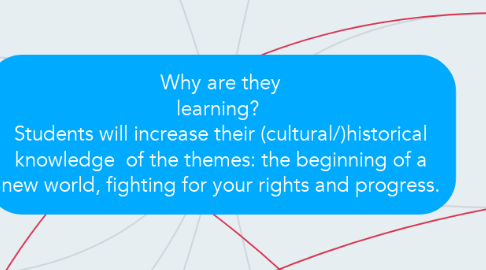
1. Towards which goals are they learning?
1.1. Testing: At the end of this curriculum....
1.1.1. Listening
1.1.1.1. Students can understand the main points of clear standard speech on familiar matters regularly encountered in work, school, leisure etc., including short narratives
1.1.2. Reading
1.1.2.1. Students can find and understand relevant information in every day material such as letters, brochures and short official document
1.1.2.2. Students can scan longer texts in order to locate desired information, and gather information from different parts of a text, or from different texts in order to fulfill a specific task
1.1.3. Speaking
1.1.3.1. Students can apply the knowledge they received during the course in a fluent conversation.
1.1.4. Writing
1.1.4.1. Students can write a formal letter to describing events of the past that they have learned about throughout the course with the help of key points.
1.1.5. Vocabulary
1.1.5.1. Students can use and apply vocabulary the they have received during the course
1.1.6. Grammar
1.1.6.1. Students can use and apply grammar they have received during the course
1.1.6.1.1. Present Simple
1.1.6.1.2. Past Simple
1.2. Curriculum goals:
1.2.1. At the end of this curriculum students of HAVO 3 can:
1.2.1.1. Explain what happened that conducted to the American Civil war
1.2.1.2. Reflect upon major topics in American History, American culture and the significance of the U.S. as a "world power".
1.2.1.3. Describe the contribution of the Europeans to American History
2. How is their learning assessed?
2.1. Project
2.1.1. Speaking
2.2. Testing
2.2.1. All four language skills
2.2.1.1. Listening/watching
2.2.1.2. Reading
2.2.1.3. Writing
2.2.1.4. Speaking
2.2.2. Grammar
2.2.3. Vocabulary
3. When are they learning?
3.1. 6 weeks
3.1.1. Week 1
3.1.1.1. Lesson 1 Lesson 2 Lesson 3
3.1.2. Week 2
3.1.2.1. Lesson 4 Lesson 5 Lesson 6
3.1.3. Week 3
3.1.3.1. Lesson 7 Lesson 8 Lesson 9
3.1.4. Week 4
3.1.4.1. Lesson 10 Lesson 11 Lesson 12
3.1.5. Week 5
3.1.5.1. Lesson 13 Lesson 14 Lesson 16
3.1.6. Week 6
3.1.6.1. Lesson 17 Lesson 18 Project
4. Where are they learning?
4.1. In a classroom
4.2. At home
5. With whom are they learning?
5.1. Co-operative learning
5.2. Expert groups
5.3. Work in DUO's
5.4. Denken- Delen- Uitwisselen
6. With what are they learning?
6.1. Youtube
6.2. Kahoot.it
6.3. Mindmeister
6.4. Socrative
6.5. Pixton
7. How is this teacher facilitating their learning? By using:
7.1. TBL
7.2. Communicative approach
7.3. PPP
7.4. Reading and listening strategies
7.5. Co-operating learing
8. How are they learning?
8.1. Videos
8.2. Infographic
8.3. Illustrations
8.4. Maps
8.5. Articles
8.6. Flip the classroom
9. What are they learning? Theme: American History
9.1. 6 Lessons
9.1.1. Native Americans
9.1.2. Puritans
9.1.2.1. part 1: Who are they?
9.1.2.2. Part 2 Lifestyle
9.1.2.3. part 3: Salem witch hunt
9.1.3. Boston Tea Party
9.1.3.1. Part 1: What is the Boston Tea Party?
9.1.3.2. Part 2: 13 colonies
9.2. 6 Lessons
9.2.1. American Revolution War
9.2.1.1. Part 1: The War
9.2.1.2. Part 2: Independence day
9.2.2. American Civil War
9.2.2.1. Part 1: The causes of the Civil war
9.2.2.2. Part 2: American Civil War facts
9.2.2.3. Part 3: The aftermath of American Civil War
9.2.2.4. Part 4: The reconstruction of the Civil War
9.3. 6 Lessons
9.3.1. Roaring twenties
9.3.2. Prosperity and problems
9.3.3. Black Americans
9.3.4. Balans of terror
9.3.5. American Country

